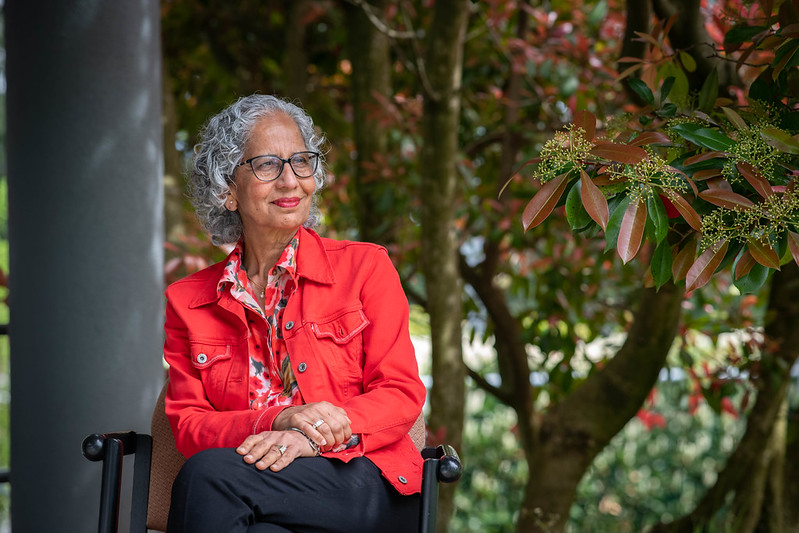Faculty Service Excellence 2021: Satwinder Bains’ impact is mighty at UFV and beyond
 A visionary leader with an unshakable commitment to equality and cultural justice, Dr. Satwinder Bains is the 2021 recipient of UFV’s Faculty Service Excellence Award.
A visionary leader with an unshakable commitment to equality and cultural justice, Dr. Satwinder Bains is the 2021 recipient of UFV’s Faculty Service Excellence Award.
“As a woman of colour, not only is she smashing glass ceilings of patriarchy within academia, but also in conservative cultural spaces,” says Anita Lal, co-founder and director of the Poetic Justice Foundation, and one of Bains’ many nomination references.
“With each win she brings down barriers for future generations of women.”
And as her robutst CV attests, Bains is no stranger to putting in the hard work it takes to make a difference.
An early association with Abbotsford Community Services led to connections at UFV, inspiring Bains to join the university more than a decade ago. Today, she is as an associate professor in the department of Social Cultural and Media Studies. In addition to teaching, she made an immediate impact by spearheading a $2.25M donation drive crucial to establishing the BC Regional Innovation Chair in Canada-India Partnership Development — and with it UFV’s South Asian Studies Institute, which she has guided as director since 2006. That same year saw the establishment of UFV India, powered by the efforts of DJ Sandhu, with Bains working closely alongside. She served as director of UFV India from 2013-2017 before ascending to principal through 2019, making frequent trips to the campus in Chandigarh, located down a winding drive from her picturesque hometown of Shimla.
“I never dreamt we’d have a campus in India, that we’d have international students constantly coming, and that’s been such a beautiful extension of our ideas,” says Bains, a 2015 recipient of the Order of Abbotsford.
Even with her days and nights packed with meetings, mentorship, research, and teaching, Bains never loses focus on effectively collaborating across boundaries, contributing to engaging learners, transforming lives, and building community.
“At the South Asian Studies Institute, we’re trying to be very relevant to society. We aren’t just barriers and a moat; we’re a porous space that has to allow ideas to filter in and out and we spend time studying those ideas. My own personal motivation is to be relevant, to be in the here and now, to be current, but while understanding my past.”
That intergenerational connectivity drives Bains’ tireless study of South Asian Canadian experience in Canada, including a diaspora with uniquely continuous ties to India — but her focus isn’t simply backfilling the past.
“We haven’t spent the right amount of time, or studied the right kind of history. I feel the study of Canada is so important, because within Canada we call on multicultural communities of people to understand each one as a link to each other. So if I’m strong, and there’s somebody else who’s strong we’re a better society. But if I’m strong and I pull others down and weaken others then society is weakened.”
It’s a commitment witnessed firsthand by The Reach Gallery Museum executive director Laura Schneider through their work together with Abbotsford’s Sikh Heritage Museum.
“Satwinder’s contributions spark both individual and collective transformation,” Schneider says, calling Bains “an enlightened civic leader in our community whose work contributes greatly to the reputation of UFV locally, nationally, and internationally.”
In addition to The Reach, Bains has also collaborated with the Abbotsford Community Foundation, the FV Indo-Canadian Business Association, the Vancouver Maritime Museum, the Royal BC Museum in Victoria, and Hockey Night in Canada, and served as a commissioner of the BC Agricultural Land Commission and as a bencher on the Law Society of BC. All this, while contributing to her successful blueberry farm with her husband Parm and loving family.
“I have a very strong belief in diversity,” she says.
“The more people that are at the table with diverse ideas, allows us all to learn and benefit from that. The whole idea of civilization is that we’re evolving, and at no point should we feel we’ve evolved to a point of no change. I see myself as an agent of change, I do appreciate that change can happen and I appreciate the value this university gives me to be an agent of change, because once your mind is expanded to a new idea it never goes back.”
By teaching at UFV and guiding research through SASI, Bains continuously gifts those same motivations to a new generation of learners.
“It’s those seeds that you lay on the way,” she explains.
“A single person can’t do everything. I see the university as a very important part of the community. I’m simply a sum of all its parts.”




